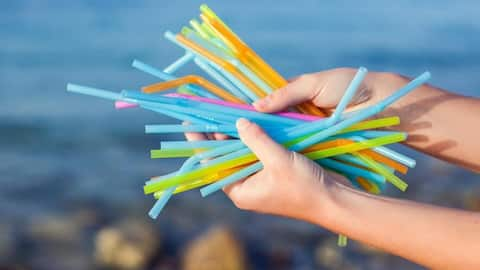This is how fast biodegradable straws break down in ocean
What's the story
Straws are a major contributor to plastic pollution on our coastlines, prompting scientists and manufacturers to seek eco-friendly alternatives. A recent study by Woods Hole Oceanographic Institution (WHOI) scientists and bioplastic manufacturer Eastman examined the degradation rates of various plastic and paper straws in coastal ocean environments. The researchers placed eight types of straws in a tank with flowing seawater from Martha's Vineyard Sound, Massachusetts, and monitored them for 16 weeks.
Setup
Experiment setup and methodology
The study discovered that cellulose diacetate (CDA), polyhydroxyalkanoates (PHA), and paper straws degraded up to 50%, with an estimated environmental lifetime of 10-20 months in coastal oceans. However, polylactic acid (PLA) and polypropylene (PP) straws showed no signs of degradation. Based on the research, experts note that it is encouraging to know that certain bioplastic straws break down rather rapidly.
Outcome
Results show varying degradation rates
The scientists compared two CDA straws provided by Eastman - one solid and the other foam - to see if increasing the surface area would speed up the breakdown process. The foam straw degraded 184% faster than the solid one, resulting in a shorter projected environmental lifetime than paper straws. According to researcher Bryan James, foam straws have the benefits of plastic or bioplastic straws while having a shorter projected lifetime than paper straws.
Other straws
Foam CDA straw shows faster breakdown
Jeff Carbeck, Eastman's Vice President of Corporate Innovation, highlighted the significance of collaboration between industry and academia in achieving shared goals and making a positive impact. The research team plans to continue studying the degradability of plastic materials to guide the industry's future direction. According to him, their goal is to make their goods as environmentally friendly as possible while still keeping the planet healthy in the long run.
Best straw
What to look for when buying biodegradable straws
One should look at the material, if they aim to achieve sustainability. Not all paper straws are good, especially the ones made using virgin wood. Always go for plant-based straws or other eco-friendly alternatives to eliminate the risk of toxins and safeguard the planet. Wheat straws, bamboo straws, glass straws, stainless steel straws, and silicone stress are some examples.
